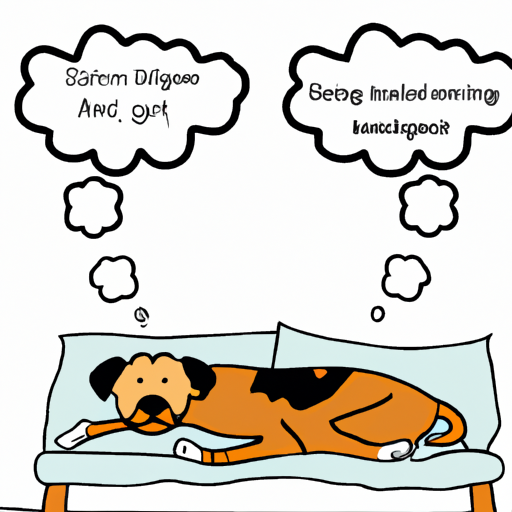1. Understanding Canine Dreams
Just like you, your four-legged friend dreams too. Dogs, in fact, have a similar sleep cycle to humans, encompassing both Rapid Eye Movement (REM) and non-REM stages. It’s during the REM stage that dreams typically occur, and if you’ve ever noticed your pup twitching, whimpering, or even barking in their sleep, they’re likely in the middle of a dream.
Dreams are a way for both humans and dogs to process the day’s events. Just as you might dream about a challenging workday or an upcoming event, your dog may be reliving their afternoon chase with a squirrel or a fun-filled fetch session.
2. Why Barking Occurs
Barking in sleep is primarily a form of dream communication. Dogs, unable to talk, express themselves through physical actions and vocalizations. So, when they’re deep in dreamland, those vocalizations can manifest as barks, howls, or whimpers. This is a completely normal behavior and is generally no cause for concern.
However, if the barking becomes excessive, it may be indicative of a sleep disorder such as REM behavior disorder or sleep apnea. In such cases, it’s always advisable to consult with a vet.
3. How to Respond to Your Dog’s Nighttime Barking
As a caregiver, your instinct might be to wake your dog up when they start barking in their sleep. But is this the right course of action?
Generally, it’s best to let sleeping dogs lie. Waking them abruptly could startle them, causing confusion or anxiety. However, if the barking is persistent, gently waking them can help. Here’s a step-by-step guide:
- Approach your dog slowly.
- Speak in a soft, calming voice.
- Gently stroke their fur to rouse them.
4. Preventing Excessive Barking
While some barking is normal, excessive barking can be a problem. Here are some tips to prevent it:
- Establish a regular sleep schedule: Dogs thrive on routine.
- Provide ample exercise: A tired dog is a good dog.
- Create a quiet, comfortable sleeping environment: A cozy bed in a quiet room can help minimize disturbances.
5. When to Seek Professional Help
If the barking persists, it might be time to consult with a veterinary behaviorist. They can provide a comprehensive evaluation and recommend a treatment plan tailored to your dog’s specific needs.
FAQ
Q: Is it normal for dogs to bark in their sleep?
A: Yes, it is quite common for dogs to vocalize in their sleep.
Q: What does it mean when a dog barks in their sleep?
A: It typically means they are dreaming. However, excessive barking could indicate a sleep disorder.
Q: Should I wake my dog if they’re barking in their sleep?
A: Generally, it’s best to let them sleep, but if the barking is excessive, waking them gently is okay.
Q: How can I prevent my dog from barking excessively in their sleep?
A: Establishing a consistent sleep schedule, ensuring they get enough exercise, and creating a quiet, comfortable sleep environment can help.
Q: When should I seek professional help?
A: If the barking continues despite your efforts, it’s a good idea to consult with a veterinarian.



